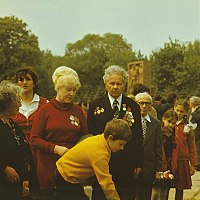WHAT IS VICTORY DAY?
Celebrated annually on May 9th, Victory Day is a celebration by former Soviets that commemorates the surrender of the Nazi’s in 1945. However, the roots of the celebration run much deeper than the defeat of the Nazis and are largely built upon the ideological defeat of fascism. The holiday was inaugurated in 1945 in the 15 republics of the Soviet Union, following the signing of the German instrument of surrender. It marked the end of the Great Patriotic War for the USSR, which lost roughly 27 million citizens in the four years of fighting. Though the official inauguration occurred in 1945, Victory Day first became a non-labor day only in 1965. Today, Russia, most former Soviet states, Serbia, Israel and former members of the Warsaw Pact observe Victory Day.

Moscow Victory Day Parade 1945
HISTORY
The inaugural Victory Day celebration in Russia was highlighted by the Moscow Victory Parade of 1945. This marked the longest and largest military parade ever held on Red Square in the Soviet capital Moscow. It involved 40,000 Red Army soldiers and 1,850 military vehicles and other military hardware (Victory Day, 9 May). However, after its inaugural celebration, at first, Victory Day was much less celebrated in the subsequent years. This was largely due to the fact that Stalin was concerned that too much celebration would fill veterans with excessive pride and feelings of independence. Additionally, immediately following the war, Stalin downplayed the massive impact that the war had on the Soviet people, labeling the death toll at only 7 million. However, in 1965, the 20th anniversary of the holiday, Victory Day began to gain importance and was made a national holiday. The holiday remained somewhat of a solemn day as many of the commemorations remained private affairs, where veterans, would get together and remember the battles they fought and those who did not return. After 1965, the next Victory Day Parade wasn’t held until 1985 to celebrate the 40th anniversary. After 1985, the next parade was held in 1990 but, due to the policies of successive Russian governments, Victory Day celebrations did not include mass gatherings and remained somewhat of a solemn day. However, beginning in 1995 this ideology shifted and the Moscow Victory Day Parade had been held every single year (Lipman, 2017).

Victory Day Celebration in 1980
SOVIET HOLIDAYS IN GENERAL
According to Greisha Berman, who immigrated to New York in 1990, other than New Years, very few cultural or religious holidays were observed in the Soviet Union. He attributed this to the fact that there was no real culture or religion in the Soviet Union other than strict adherence to communism. The leaders of the Soviet Union attempted to denounce and flush out all religious celebrations from the country. However, Mr. Berman explained that Victory Day became so huge in the Soviet Union because it changed the entire country’s psyche due to the massive impact that it had on everyone in the country. It became observed as a day of national sacrifice and therefore wasn’t viewed as propaganda by the Soviet government. Mr. Berman highlighted that Victory Day was also very important to those who didn’t share in communist beliefs. Mr. Berman’s grandfather, Ivan Berman, who was a war veteran himself, proudly walked around on Victory Day displaying his medals, despite covertly being anti-communism.
